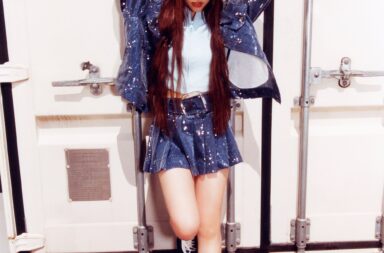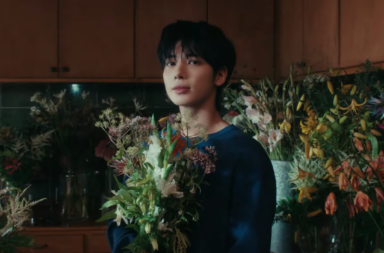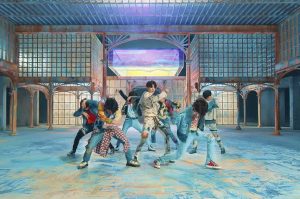 BTS may have debuted as underdogs, but in the run-up to the release of their third LP Love Yourself: Tear, it became clear that the record’s commercial success would not only be certain, but cement the band’s status as trailblazers for the mainstream globalisation of K-pop. Love Yourself: Tear became the most pre-ordered album of all time in South Korea after just six days on sale. Within a few hours of release, the album shot to number one on the US iTunes chart. The problem is that by now BTS have smashed through so many records, each new statistic just becomes the next entry in the list. Title track “Fake Love” may be the most highly anticipated K-pop release this year, yet its biggest challenge is not to top charts, but to justify its own hype by raising the bar BTS have already set sky-high.
BTS may have debuted as underdogs, but in the run-up to the release of their third LP Love Yourself: Tear, it became clear that the record’s commercial success would not only be certain, but cement the band’s status as trailblazers for the mainstream globalisation of K-pop. Love Yourself: Tear became the most pre-ordered album of all time in South Korea after just six days on sale. Within a few hours of release, the album shot to number one on the US iTunes chart. The problem is that by now BTS have smashed through so many records, each new statistic just becomes the next entry in the list. Title track “Fake Love” may be the most highly anticipated K-pop release this year, yet its biggest challenge is not to top charts, but to justify its own hype by raising the bar BTS have already set sky-high.
While the majority of K-pop groups turn on a dime with each new comeback, proving their versatility by exploring a spectrum of different concepts, BTS have created a blueprint for success. Since the release of The Most Beautiful Moment in Life Part 1 in 2015, the group shifted focus from hard-hitting hip-hop driven title tracks to singles powered by the vocal line. They branded these with an aesthetically pleasing style of melancholy: the parallel plotlines in “I Need U”, the elaborate literary allusions of “Blood Sweat and Tears”, and the kaleidoscopic aesthetics in “DNA” all serve to reflect some aspect of the intense, often destructive romance explored in each song’s lyrics. Fans are hooked on the fictional universe the group has woven around this mix of metaphors, but with “Fake Love” sticking to the formula, we’ve seen this before, and the question is: how can BTS stay true to the identity they’ve forged while continuing to move forwards?
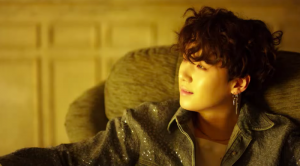 One of the features of “Fake Love” that will immediately stand out to fans is how it reshapes the symbolism of past music videos to fit Tear’s new take on love and loss. The choreographic formations and muted colours of the performance shots echo “DNA”, the multi-layered sets are similar to the unnerving dreamscape of the Japanese MV for “Blood Sweat and Tears”, while the final chorus cuts between scenes refashioned from “I Need U”. We see Jimin engulfed by a torrent of water, Suga welcoming his second fiery demise and J-Hope curling up on a bed of sweets in a fetal position identical to the one he collapses into during “I Need U”’s second chorus.
One of the features of “Fake Love” that will immediately stand out to fans is how it reshapes the symbolism of past music videos to fit Tear’s new take on love and loss. The choreographic formations and muted colours of the performance shots echo “DNA”, the multi-layered sets are similar to the unnerving dreamscape of the Japanese MV for “Blood Sweat and Tears”, while the final chorus cuts between scenes refashioned from “I Need U”. We see Jimin engulfed by a torrent of water, Suga welcoming his second fiery demise and J-Hope curling up on a bed of sweets in a fetal position identical to the one he collapses into during “I Need U”’s second chorus.
 The recurrence of each motif cleverly reinforces the visual coherence of BTS’s catalogue of music videos, but jars with the band’s promotional strategy. With “Fake Love” released on a Friday to give it a headstart on the Billboard charts, and BTS debuting the track live on American TV, it seems they’re gunning to strengthen their international fanbase. But while hunting for these Easter eggs is a treat for fans well-versed in BTS’s backlist, the abundance of symbols and meanings could be confusing for newcomers. And as the links within the narrative grow more tangled, BTS tread a fine line between finding new depth and rehashing old ideas.
The recurrence of each motif cleverly reinforces the visual coherence of BTS’s catalogue of music videos, but jars with the band’s promotional strategy. With “Fake Love” released on a Friday to give it a headstart on the Billboard charts, and BTS debuting the track live on American TV, it seems they’re gunning to strengthen their international fanbase. But while hunting for these Easter eggs is a treat for fans well-versed in BTS’s backlist, the abundance of symbols and meanings could be confusing for newcomers. And as the links within the narrative grow more tangled, BTS tread a fine line between finding new depth and rehashing old ideas.
Yet “Fake Love” finds its footing amongst this thematic kaleidoscope by broadening the lens. We see its title encapsulated in the scene that unfolds just before the final chorus, as Jungkook finds the flower from the first shot gone. Instead, the empty lantern is surrounded by sand, perhaps to symbolise love and hope turning to death and dust. The petals are only visible in shadow, a clear indication that love can be illusory.
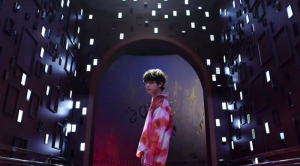 More intriguing is V’s set, hung with a myriad of lit screens. The high-tech backdrop may allude to the unattainable ideals depicted by celebrities and audiences alike on social media, or even the fleeting quality of the fame BTS are currently riding. This idea is further explored in the symbiotagram scribbled on the wall behind V. It is intriguing that “save me” is the primary message, and “I’m fine” the hidden one, suggesting that it is only possible to separate truth from illusion and find peace with oneself through the trauma of breaking down the facades we often use to fit in to society. This juxtaposition encapsulates the overarching theme of the MV, as BTS struggle to hold on to their “Fake Love”.
More intriguing is V’s set, hung with a myriad of lit screens. The high-tech backdrop may allude to the unattainable ideals depicted by celebrities and audiences alike on social media, or even the fleeting quality of the fame BTS are currently riding. This idea is further explored in the symbiotagram scribbled on the wall behind V. It is intriguing that “save me” is the primary message, and “I’m fine” the hidden one, suggesting that it is only possible to separate truth from illusion and find peace with oneself through the trauma of breaking down the facades we often use to fit in to society. This juxtaposition encapsulates the overarching theme of the MV, as BTS struggle to hold on to their “Fake Love”.
RM and Suga delve deeper into the importance of being honest with oneself in their lyrics. The former questions his identity: “But I dunno me, who are you?” while the latter suggests others are losing faith in him: “You say I’m not myself which you knew well”. Both references to a false identity continue each rapper’s interrogation of their own artistic credibility in their solo mixtapes, and the visuals corroborate this, with RM standing before a mirror that recalls “Reflection” and Suga sitting before a piano alluding to “First Love”. This personal touch gives “Fake Love” the authenticity it needs to distinguish itself.
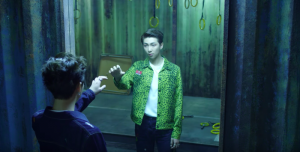 Critics have often attributed BTS’s global success to their lyrical probing of social issues – yet B.A.P were covering similar ground a year prior to their debut. Others have cited BTS’s avant-garde melding of genres as instrumental in carving out their own sound. But Big Bang have been remixing hip-hop with elements of rock, pop and trap for over a decade. While these factors have helped set the band apart from the pack, BTS have gone further than most idols by melding their own experiences with their music.
Critics have often attributed BTS’s global success to their lyrical probing of social issues – yet B.A.P were covering similar ground a year prior to their debut. Others have cited BTS’s avant-garde melding of genres as instrumental in carving out their own sound. But Big Bang have been remixing hip-hop with elements of rock, pop and trap for over a decade. While these factors have helped set the band apart from the pack, BTS have gone further than most idols by melding their own experiences with their music.
Listening to tracks like “Path”, “Airplane Pt. 2” or the pre-debut gem “Born Singer”, the listener connects to the boys behind the sophisticated textual allusions and elaborate sets. “Fake Love”, like these B-sides, is anchored by the implication that the members are engaging with the track’s core questions of authenticity and identity, as much as the listener is encouraged to. Lyrically “Fake Love” reveals multiple layers of meaning:
I grew a flower that can’t be bloomed in a dream that can’t come true
This line poetically wraps up the romance thread, yet BTS delve deeper:
For you I could pretend like I was happy when I was sad
For you I could pretend like I was strong when I was hurt
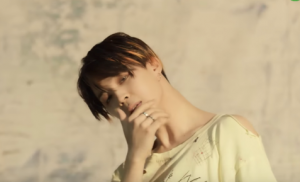 The ideas here are universal, and could refer to the relationship between family members or friends as much as they hint at romantic love. The lines also link to the central theme of “Airplane Pt. 2” and may allude to the members’ own struggles to show only their best selves on stage. The subtleties in the choreography tie-in with this notion, utilising the Japanese pictorial maxim–“See no evil, hear no evil, speak no evil”–of the three wise apes to demonstrate the way truth can be hidden or ignored. The effects of this are depicted both through the anguish expressed through the choreo’s flowing contemporary style and the grungy, guitar-driven soundscape that shapes the song itself.
The ideas here are universal, and could refer to the relationship between family members or friends as much as they hint at romantic love. The lines also link to the central theme of “Airplane Pt. 2” and may allude to the members’ own struggles to show only their best selves on stage. The subtleties in the choreography tie-in with this notion, utilising the Japanese pictorial maxim–“See no evil, hear no evil, speak no evil”–of the three wise apes to demonstrate the way truth can be hidden or ignored. The effects of this are depicted both through the anguish expressed through the choreo’s flowing contemporary style and the grungy, guitar-driven soundscape that shapes the song itself.
 From V’s first line, autotune lends an almost eerie quality to the members’ vocals, propelling the track with a breathy airiness that plays off against its alt-rock core. The bare-bones of the trap-influenced verses allow RM, Suga and J-Hope to trade bars and hold the listener’s intrigue before the song plunges into a pre-chorus that builds around a lush electronic backdrop. These layers of instrumentation drive the track’s gritty tone while never overwhelming the members’ performance. “Fake Love” draws its energy from the ebb and flow between its players, the rap line delivering their verses with an urgency that is visceral when set against the melancholy tone Jin, V, Jimin and Jungkook bring to the bittersweet choruses. The song never lulls in its intensity, packing the emotive punch that has come to define BTS’s signature sound.
From V’s first line, autotune lends an almost eerie quality to the members’ vocals, propelling the track with a breathy airiness that plays off against its alt-rock core. The bare-bones of the trap-influenced verses allow RM, Suga and J-Hope to trade bars and hold the listener’s intrigue before the song plunges into a pre-chorus that builds around a lush electronic backdrop. These layers of instrumentation drive the track’s gritty tone while never overwhelming the members’ performance. “Fake Love” draws its energy from the ebb and flow between its players, the rap line delivering their verses with an urgency that is visceral when set against the melancholy tone Jin, V, Jimin and Jungkook bring to the bittersweet choruses. The song never lulls in its intensity, packing the emotive punch that has come to define BTS’s signature sound.
With the grittier vibe of the song visually realised in the elemental chaos of the final chorus, the mood seems set to descend into darkness. But as the song comes to a close Jungkook walks alone to meet a mysterious figure that brings the viewer back full circle to the track’s first teaser clip. This sequence illustrates the concept of the Magic Shop, a psychodramatic technique that transforms negative emotions such as fear into a positive approach. In this way, BTS hint at a redemption from the destruction of “Fake Love”’s final chorus, leading into a new era yet to come.
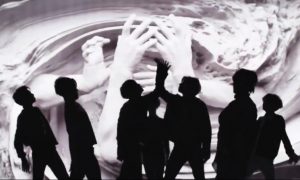 In an oversaturated music industry, K-pop thrives on blending genres. But its dependence on the constant refreshing of concepts and visuals can blur the boundary between the innovative and chaotic. While “Fake Love” may first appear to be a rehash of the familiar, through a careful cohesion of lyrical, aesthetic and thematic content, BTS fine-tune their signature set-pieces to reach for greater depth. At a pivotal moment in their career, the septet prove that they can maintain a recognisable sound and image, while continuing to test new ground. The stage is set, and we’re all waiting for the next chapter of the story.
In an oversaturated music industry, K-pop thrives on blending genres. But its dependence on the constant refreshing of concepts and visuals can blur the boundary between the innovative and chaotic. While “Fake Love” may first appear to be a rehash of the familiar, through a careful cohesion of lyrical, aesthetic and thematic content, BTS fine-tune their signature set-pieces to reach for greater depth. At a pivotal moment in their career, the septet prove that they can maintain a recognisable sound and image, while continuing to test new ground. The stage is set, and we’re all waiting for the next chapter of the story.
(Forbes, YouTube [1] [2] [3] [4] [5] [6] [7] [8] [9] [10], Lyrics via Genius, Images via Big Hit Entertainment)

